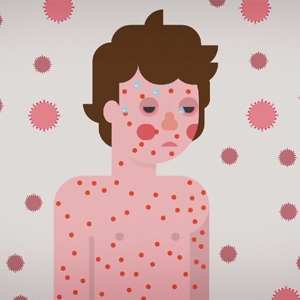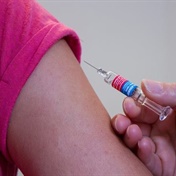
The Department of Health has launched a mass measles immunisation programme in an effort to eradicate this preventable disease. Why is it so important to immunise your child against measles? It is not just a common and harmless childhood infection. The disease can have serious complications and long-term consequences. In fact, children are still dying from measles in South Africa.
As recently as the 1970s, hundreds died every year in South Africa from measles.
Measles is now rare thanks to successful vaccination programmes. But, because the serious consequences of measles and other serious diseases are no longer familiar, people have ceased to fear them. Despite the risk for death due to measles complications, and the availability of an effective tool to prevent these deaths, there are still children who are not vaccinated.
The incidence of measles is still significant in neighbouring countries such as Zimbabwe, Angola and Mozambique, where vaccination programmes have broken down through war and social upheaval. The disease can rapidly re-enter South Africa if it is given the opportunity. All that is required is a large number of unvaccinated children.
The routine immunisation coverage target for fully immunised children under one year in South Africa is 90%. According to 2003 statistics, measles immunisation coverage is 78%. This figure is below the set target and thus puts the country at a high risk for measles outbreaks. This was clearly demonstrated by the measles outbreaks in Mpumalanga and Gauteng provinces in 2003.
The Department of Health’s 2004 immunisation programme aims to render wider immunity over a greater geographical area. As a result, Lesotho and Swaziland will simultaneously conduct a similar campaign.
The objective of the Department’s immunisation campaign is to give children booster doses that will provide them with additional protection against measles. All children aged nine months to under five years should receive the measles vaccine during 26 to 30 July, regardless of their previous vaccination record. This will cover not only those children who have not received the vaccine for some reason, but also the small percentage in whom the vaccine does not "take" or work for whatever reason.
Why is measles a threat?
Measles can have serious complications. These are more likely in malnourished children. Vitamin A deficiency in particular worsens the course of measles. The disease also tends to be more severe in infants younger than one year and in any person who is immunosuppressed, for example people with HIV-infection or leukaemia.
The complications that can occur, are as follows:
- Croup (inflammation of the vocal cords and upper airways) is apparent by difficult and noisy efforts to inhale.
- Pneumonia can be due purely to the measles virus itself, but is more often because of added infection of the damaged airways and lung surfaces by other viruses or bacteria. Pneumonia becomes evident through rapid, difficult breathing, worsening cough and chest pain.
- Middle ear infection is very common and is apparent from pain in the ear.
- Diarrhoea is usually mild but in malnourished children it can be severe and prolonged and further compromise the child’s nutrition.
- Inflammation of the gut can, very occasionally, lead to appendicitis in measles.
- Bacterial infection (profuse pus) of inflamed eyes and scarring of the cornea with partial blindness is another risk for malnourished children if the eyes are not attended to early enough.
- Measles leaves the individual's immune system suppressed for some weeks to months afterward. It is believed that in South Africa and other developing countries this contributes to flaring up or reappearance of tuberculosis in children.
- Another more immediate consequence of the immune dysfunction can be severe herpes ulceration of the mouth.
- Encephalitis (inflammation of the brain) occurs in about 1/1 000 cases of measles. The complication can develop in mild cases of measles. Encephalitis usually occurs from two to seven days after the start of the rash, when the child should be starting to recover. At least 10 percent of children with measles encephalitis die and some are left with mental retardation, deafness, paralysis or epilepsy. A delayed, fatal form of encephalitis appearing weeks to months after measles can occur in immunocompromised persons.
- Subacute sclerosing pan-encephalitis (SSPE) is an extremely rare but dreaded condition occurring usually many years after measles. For unknown reasons, the virus persists in a weakened form in the brain of a very small number of people infected with measles, and eventually begins to cause degeneration in areas of the brain. There is a slow downhill progression to death in every case.
- Very rarely the rash may be dark ("black" measles) due to bleeding into the skin. This severe type of measles has a high fatality.
(Liesel Powell, Health24)




 Publications
Publications
 Partners
Partners















